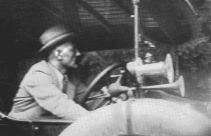
[By 1930, A. R. Orage had been in New York for almost 7 years and] his thoughts turned again towards England. With increasing strain between himself and his leader, Orage began to allow himself fully to recognize how utterly different was his own destiny from that of a man like Gurdjieff. For as soon as he realized that he could no longer work under such leadership, and that the ‘school’ had a somewhat proprietary claim to the system of ideas he was teaching, he felt no power to go on unless he found a new initiative and a new didactic psychology in himself alone. And when he looked into himself, he found nothing of the kind. His ambition, such as it remained, and his abilities were of quite another order.Gurdjieff was decisive, that his school was a school of individuation, and that a man must find his own work in life. How should he know it, how choose it? That, no one else could tell him. There were certain laws about it, however—three in particular. The goal of achievement which a man decides to aim at must be such that it involves no violation of moral norms. Secondly, he must get something for himself out of it—whether it be money, health and happiness, or honour; some genuine profit must accrue to himself. Thirdly, the task he assumes must be neither too big for him, nor too small. If it be too big, he will incur failure, compensated by megalomania; if too small, his powers will decline even with success and his career will be embittered. But provided these three conditions be fulfilled, it does not matter what any one thinks of a man's work. All that is necessary is that it should fit him; and that it should be his true desire—if you like, his whim—to do it. For example, to have the best stamp-collection in the world would not appear to many people to be a life ambition of the highest dignity—and perhaps it is not. But it is a job of a man's size: and if it is your real whim, you had better live for it. Whether you succeed is, of course, another matter.
Whilst they were talking in this vein, someone asked Gurdjieff if he would disclose his own 'whim,' and he said it was to live and teach so that there should be a new conception of God in the world, a change in the very meaning of the word. Orage, taking up the gauntlet, said that for his part, his 'whim' was to produce and edit the best weekly journal in England.
From A. R. Orage: A Memoir by Philip Mairet, University Books, 1966, pp. 104–5.
Herein we are launching much new material in a revised format and invite your comments and suggestions as well as contributions in the way of letters and essays. What do you think of the changes we have made? Are there specific articles you recommend for inclusion or subjects you wish us to research and cover with an article?
J. Walter Driscoll
Greg Loy
|
This webpage © 1997 Gurdjieff Electronic Publishing Featured: Fall 1997 Issue, Vol. I (1) |